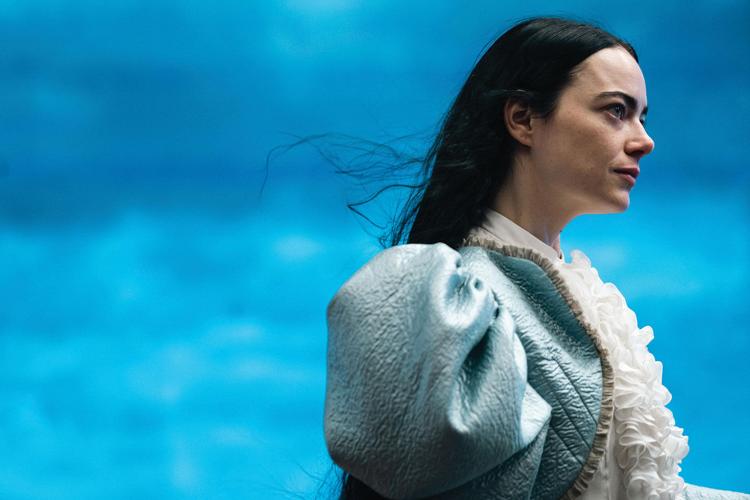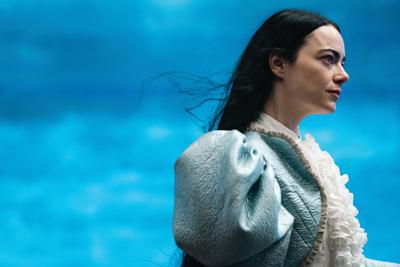Over the course of two decades and with a steady, consistent filmography, writer-director Yorgos Lanthimos has established himself as the foremost voice of the so-called Greek Weird Wave — a loose assortment of vaguely avant-garde filmmakers that also includes Lanthimos’ fellow countryfolk Christos Nikou, Athina Rachel Tsangari and Panos H. Koutras. Indeed, Lanthimos’ early Greek-language films and his first two English-language films, 2015’s The Lobster and 2017’s The Killing of a Sacred Deer, are confident and unique. Those films are wry but not laugh-out-loud funny; they’re dark, with plots reliant on magical realism.
And then came 2018’s sensational The Favourite. Co-written by Tony McNamara and Deborah Davis, the black-comedy period piece centers on Queen Anne’s relationship with two of her courtiers and earned a staggering 10 Academy Award nominations. (It won just one — the trophy for Best Actress went to the very deserving Olivia Colman.) Easily Lanthimos’ most mainstream film, The Favourite was marked by phenomenal art direction and costuming, endlessly funny dialogue and magnificent performances from Colman and her co-stars Emma Stone and Rachel Weisz.
Lanthimos is back this month with Poor Things, his second collaboration with both McNamara and Stone, and it’s his best and most intoxicating film yet.
Set in a sort of alternate-universe Victorian era and based on Alasdair Gray’s 1992 novel of the same name, Poor Things is ruled by an almost steampunk aesthetic, with surrealistic skies looming overhead — vibrant, technicolor and unnatural, with every cloud a smoldering fireball. Willem Dafoe is Dr. Godwin Baxter, an eccentric scientist whose face is a jigsaw puzzle of scars. He surrounds himself with various abominations — dogs with duck heads, ducks with dog heads, things of this nature. He was made a monster by an abusive father who performed experiments on the young Godwin. Though that abuse carried over in abstract form with Godwin, there’s a tender heart in there somewhere, amid all the malfunctioning, tumor-laden organs.
Godwin’s greatest and most beloved experiment is Bella (Emma Stone), a rescued corpse, reanimated postmortem. Bella’s pre-death background becomes more clear as the film goes on, but when we first meet her, she has a tenuous grip on language and motor skills, and virtually no understanding of the modern world. Stone turns in an exceptionally physical performance as Bella Baxter, who appropriately refers to Godwin as simply “God” and is frequently too naive and gut-punchingly honest to know she’s offending members of “polite society.” Her plainspokenness is charming and delightfully bizarre, and as she travels throughout Europe gathering more experiences — most of them sexual and/or hedonistic in nature — she develops a sense of pragmatism and a penchant for listing synonyms in groups of three. As Stone’s character evolves, her physicality and manner of speaking evolve. She is brilliant here, and Mark Ruffalo is wonderful as her foil, a womanizing, self-important douchebag lawyer named Duncan Wedderburn. Ramy Youssef, Christopher Abbott, Jerrod Carmichael and legendary character actress Kathryn Hunter all turn in rich performances as well. But without Stone, none of it works.

Poor Things
Science is king in Poor Things, but it’s also sort of simply a suggestion. How exactly does stapling one animal’s head onto another’s body work so seamlessly? How can a brain dumped from one skull into another continue to function? No matter. The sense of magical realism absent from The Favourite is back with Poor Things, an unusual and unconventional film marked by a discordant, stop-start score and cinematographer Robbie Ryan’s playful, dreamlike and disorienting lensing. But it’s also somehow relatable. After all, at the core of Poor Things is a discussion about autonomy — women’s bodily autonomy, and men’s desire to possess women as though they are objects, in all eras, in all settings.
As fellow Scene critic Jason Shawhan put it at our press screening, in a world where Guillermo del Toro’s The Shape of Water can win the Academy Award for Best Picture, perhaps that’s a possibility for Poor Things as well. Maybe so. Both films are ribald and cheeky, marked by a sort of playful take on body horror that doesn’t exactly scream “awards-darling prestige period piece.” But Poor Things is wildly unique, disquieting and consistently hilarious. It’s one of the best films of the year. It just happens to also be one of the weirdest.







